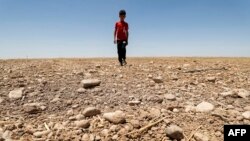Scientists from multiple organizations that monitor and assess the state of the Earth's climate system warn the world is not on track to meet the target of the Paris Agreement to limit global warming to 1.5 degrees Celsius by 2050.
The United in Science 2021 report warns greenhouse gas concentrations in the atmosphere are continuing at record levels, committing the planet to dangerous future warming. It notes the last five-year period has been the warmest since record-keeping began in 1850.
Scientists say rising temperatures due to human activity are causing higher than average temperatures in the Arctic, Europe and Asia. That is increasing the frequency and intensity of floods, droughts, wildfires, storms, and other extreme weather events throughout the world.
Secretary-General of the World Meteorological Organization Petteri Taalas says weather events that used to happen every 100 years now are happening every 20 years because of climate change. He warns they will occur with even greater frequency in the future if the world does not limit warming to well below two degrees Celsius by mid-century.
"Now we are heading towards three degrees warming instead of 1.5 to two degrees," he said."And it has been shown clearly that it would be beneficial for the welfare of us human beings and the welfare of the biosphere and the planet to reach the lower limit of the Paris Agreement of 1.5 degrees."
The report notes that COVID-19 has had no impact on climate change. It says pandemic lockdowns and economic slowdowns reduced air pollution for a time, but was only temporary. Now that societies are opening again, it says carbon dioxide emissions into the atmosphere are growing.
Taalas says mitigation measures can reduce the release of greenhouse gas emissions into the atmosphere and reduce climate change, but for this to happen, people must change their daily behavior.
"If we fail with climate mitigation, we would have a permanent problem for at least hundreds or even thousands of years and both economic and human wellbeing events would be much more dramatic than this COVID pandemic, which has been hitting us all in a dramatic way," he said.
In a forward to the United in Science report, U.N. Secretary-General Antonio Guterres warns time is running out. He says all countries must commit to net-zero emissions by 2050, backed up by concrete long-term strategies to prevent further irreversible damage.
He says these pledges must be made now for November's U.N. Climate Change Conference in Glasgow to be a turning point in the fight for the survival of the planet.





